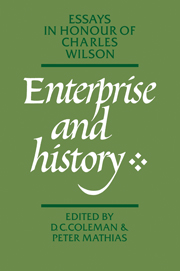Book contents
- Frontmatter
- Contents
- Preface
- List of contributors
- Part I Images and interpretations
- 1 Comparative business history
- 2 Historians and businessmen
- 3 Businessmen and their motives
- 4 La révolution manquée
- Part II England and the Low Countries in pre-industrial times
- Part III Enterprise, finance and politics in the modern world
- Bibliography of Charles Wilson's published works
- Index
4 - La révolution manquée
Published online by Cambridge University Press: 12 March 2010
- Frontmatter
- Contents
- Preface
- List of contributors
- Part I Images and interpretations
- 1 Comparative business history
- 2 Historians and businessmen
- 3 Businessmen and their motives
- 4 La révolution manquée
- Part II England and the Low Countries in pre-industrial times
- Part III Enterprise, finance and politics in the modern world
- Bibliography of Charles Wilson's published works
- Index
Summary
The most famous scenario of la révolution manquée in England was written by F. Engels in The Condition of the Working Class in England, published in German in 1845 and in English in 1887 (in USA) and 1892 (in England). This famous text, so influential with so many historians, demonstrated not Engels's powers of social analysis but rather his lack of understanding of the English working classes. He was convinced that the workers of England were so desperate that they needed only a crisis to precipitate bloody revolution. It is with this legend that this essay is concerned. Engels predicted that:
The fate of the middle classes will be sealed sooner than we have suggested. Commercial crises of ever-increasing severity (the most powerful stimulus to independent action on the part of the workers), coupled with the effects of foreign competition and the progressive ruin of the middle classes, will bring matters to a head before long. I do not think that the workers will put up with another commercial crisis. The next one – it is due in 1846 or 1847 – will probably lead to the repeal of the Corn Laws and the acceptance of the People's Charter. It remains to be seen how far the acceptance of the Charter will encourage the movement towards revolution. After the crisis of 1846 or 1847 the next crisis should (on the analogy of previous crises) occur in 1852 or 1853. It may be delayed by the repeal of the Corn Laws or it may be hastened by foreign competition or other circumstances. But before that crisis arrives the English workers will surely have reached the limits of their endurance. […]
- Type
- Chapter
- Information
- Enterprise and HistoryEssays in Honour of Charles Wilson, pp. 52 - 68Publisher: Cambridge University PressPrint publication year: 1984
- 1
- Cited by



